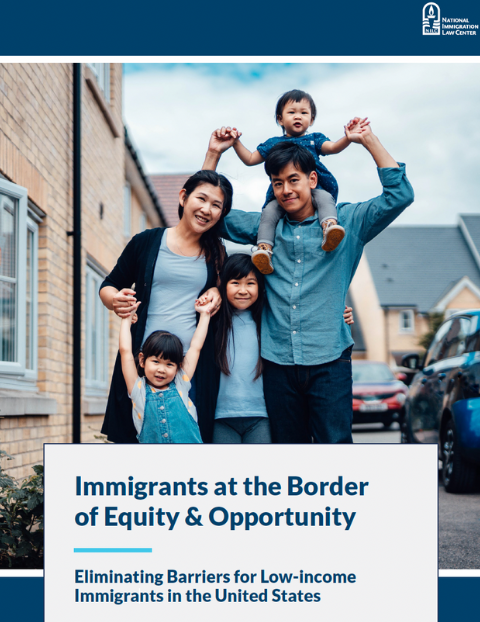Immigrants at the Border of Equity & Opportunity
Eliminating Barriers for Low-income Immigrants in the United States
National Immigration Law Center
Background
The lived experiences of immigrants in the United States do not begin and end with their interaction with enforcement and deportation regimes, despite the dominance of these issues in political rhetoric. Too often, policy discussions are missing the perspectives of immigrants themselves. As a result, policymaking fails to address the complex and layered issues affecting immigrants’ lives. Low-income immigrants face numerous disparities and inequities compared to native-born individuals and immigrants more broadly, but their voices are rarely centered in policy debates.
To address this gap, in early 2023 the National Immigration Law Center (NILC) traveled to seven different cities across the U.S. to conduct focus groups and administer surveys to immigrants with low incomes and service providers working with those communities. The focus groups included both lawfully present and undocumented participants from Africa, China, Haiti, Korea, and Latin America living in California, Florida, Nevada, New York, Tennessee, and Texas.
This report provides a summary and analysis of this survey and focus group data and offers policy recommendations to address the barriers identified by participants. The analysis examines the study’s quantitative surveys, focus group discussions, and priority-setting exercises. While other research projects focus on large-scale survey data, this report seeks to give voice to the words of immigrants on their own terms. As scholars have noted, focus groups tend to be more “contextual and less hierarchical” and can generate “high quality and interactive data.”
These findings paint a portrait of legal and economic precarity for low-income immigrants. As one Haitian immigrant from Florida explained, “Everybody is dealing with the same thing—it’s always papers, work, housing, food….” Nearly 70 percent of participating immigrants reported being food insecure, meaning they worried that food would run out before they got money to buy more in the past year. Almost half of all participants lacked health insurance, and well over half (56 percent) reported that lack of money had prevented them from getting needed health care. When asked about their top priorities, participants across all groups stressed the need for “papers and jobs”—that is, a path to legal immigration status and employment that pays a living wage with decent work conditions. Taken together, feedback from focus group participants depicts a reality that is not just determined by the broken U.S. immigration system, but also by a broken economic system that shapes the lives of immigrants and their families. Focus group participants further identified systemic linguistic, and cultural impediments. More than half of the immigrant participants reported having difficulty applying for public benefits or receiving important health information because of language issues. Participants also described experiences of racial discrimination and lack of cultural competency among service providers. This report’s findings are consonant with those of a recent Kaiser Family Foundation and Los Angeles Times (KFF/LAT) survey, which found that Black and Hispanic immigrants report higher levels of discrimination at work, in their communities, and in health care settings. Further, African and Haitian participants in this study underscored their frustration at being lumped together with other Black communities, thus erasing their important cultural differences. One of the crucial findings of this research is that policies must ensure cultural competency and adopt strategies to combat racial discrimination and anti-Blackness.
There is no one-size-fits-all policy that will meet the needs of all low-income immigrants. However, the focus groups identified many obstacles that many immigrants share, including a lack of eligibility for health insurance and other public programs, the need for language access, and the persistence of workplace exploitation. By amplifying the voices of low-income immigrants describing the challenges they confront daily, this report issues a clarion call for state, local, and federal policymakers to implement proven strategies that enable immigrants and their families to overcome structural barriers and thrive.





